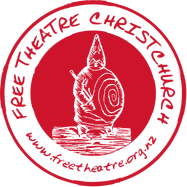Here's a word from the Director about Distraction Camp:
"At base, Distraction Camp is a performative enquiry into the nature of acting through theatre, opera, film and other media. It takes inspiration from texts about acting such as Hamlet and Jean Genet's The Balcony , and incorporates texts, images and film pieces. As it sits conceptually in relation (not quite opposition) to the "concentration camp," Distraction Camp also draws on, and is responsive to, a number of Holocaust texts, films and images. Whereas the experience of the concentration camp was one of scarcity and hunger, the current experience of late capitalism is one of obesity and obscenity, which ironically can be seen to lead to the same effect. Forced endlessly to consume entertainments that revolve endlessly around distractions and commodities, audiences have become like the Muselman , resigned to a way of living without meaning, obese yet starved of real nourishment.
In The Theatre and its Double , Antonin Artaud says, "We are not free... And the theatre teaches us that first of all." Through the lens provided by the theatrical experience, Distraction Camp will explore the effects of late capitalism on the process of art-making and the function of art now. It will make a play on the nature of acting in art and in life, and ask freshly what audiences want from theatre and film. Genet says in The Balcony : "The devil is the great Actor." As with Mephistopheles in Goethe's Faust and as with Gustav Gründgens in Fritsch's Chroma , the act of seduction is comparable to the act of performance, and the position of the audience as willing consumers and victims is questionable."
Peter Falkenberg
Artistic Director, Free Theatre Christchurch, 2009
"At base, Distraction Camp is a performative enquiry into the nature of acting through theatre, opera, film and other media. It takes inspiration from texts about acting such as Hamlet and Jean Genet's The Balcony , and incorporates texts, images and film pieces. As it sits conceptually in relation (not quite opposition) to the "concentration camp," Distraction Camp also draws on, and is responsive to, a number of Holocaust texts, films and images. Whereas the experience of the concentration camp was one of scarcity and hunger, the current experience of late capitalism is one of obesity and obscenity, which ironically can be seen to lead to the same effect. Forced endlessly to consume entertainments that revolve endlessly around distractions and commodities, audiences have become like the Muselman , resigned to a way of living without meaning, obese yet starved of real nourishment.
In The Theatre and its Double , Antonin Artaud says, "We are not free... And the theatre teaches us that first of all." Through the lens provided by the theatrical experience, Distraction Camp will explore the effects of late capitalism on the process of art-making and the function of art now. It will make a play on the nature of acting in art and in life, and ask freshly what audiences want from theatre and film. Genet says in The Balcony : "The devil is the great Actor." As with Mephistopheles in Goethe's Faust and as with Gustav Gründgens in Fritsch's Chroma , the act of seduction is comparable to the act of performance, and the position of the audience as willing consumers and victims is questionable."
Peter Falkenberg
Artistic Director, Free Theatre Christchurch, 2009


